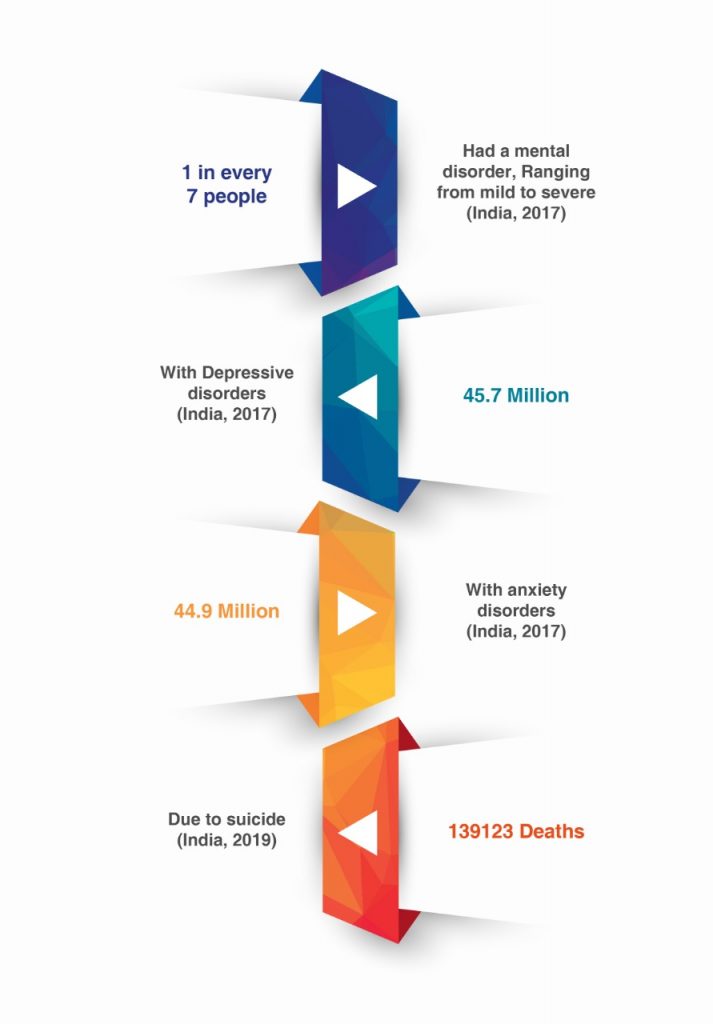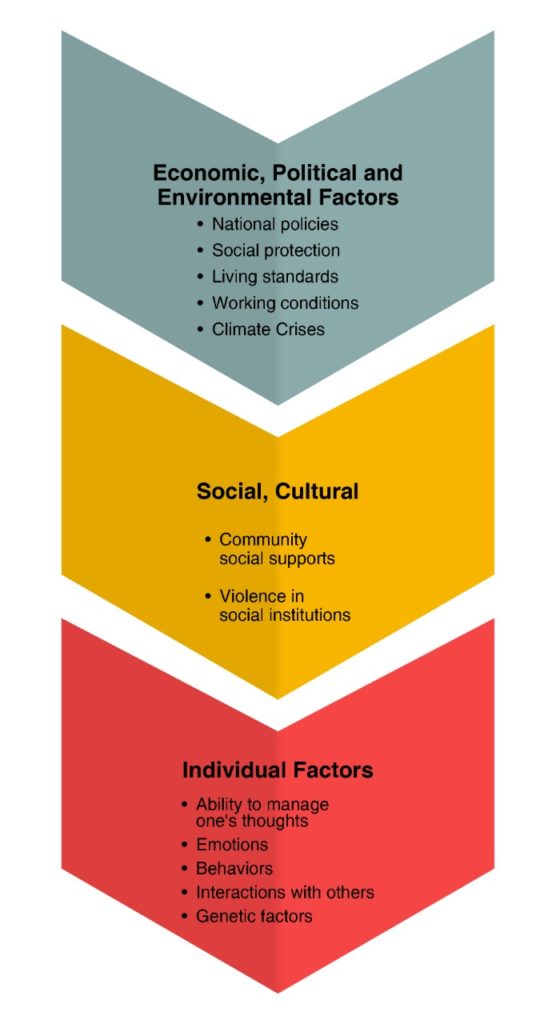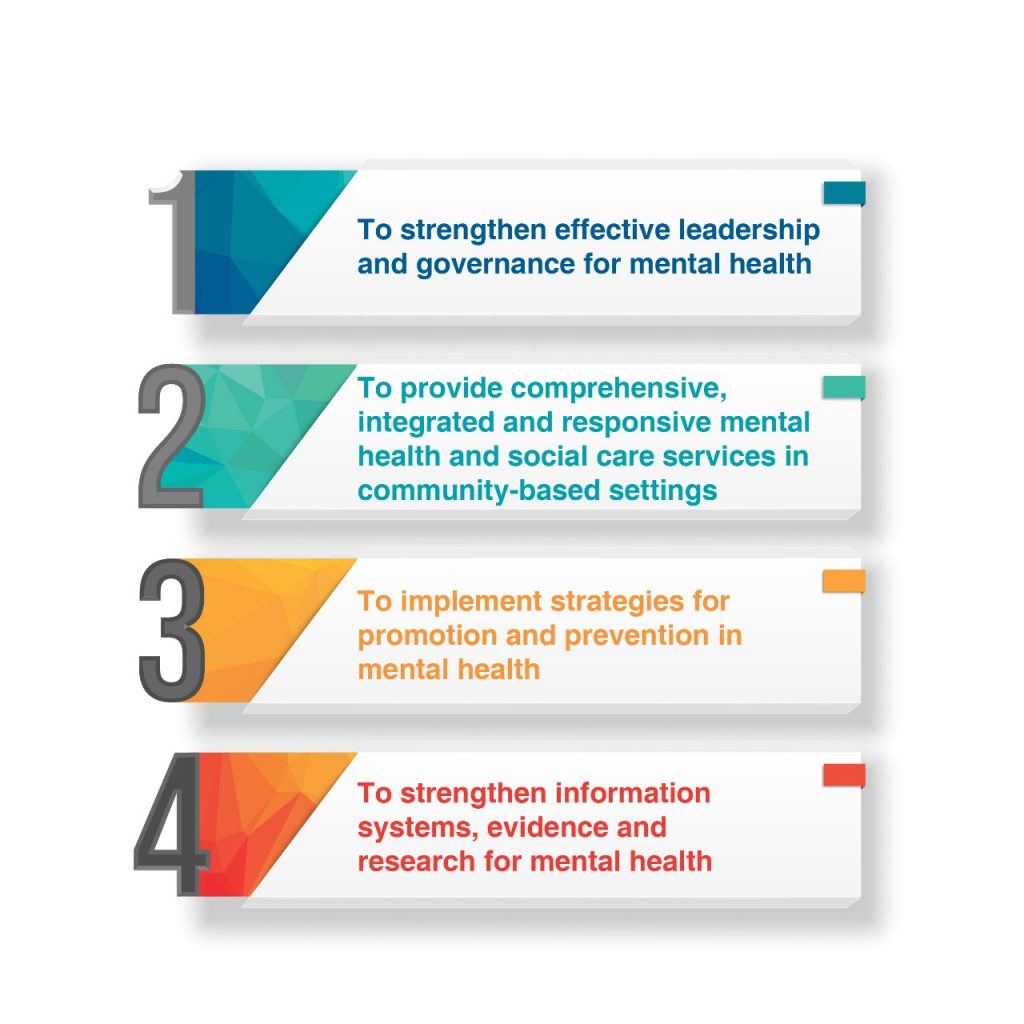Call Us: 91 9903942044 / +91 8820713621 Email Us: info@isankalpa.org
Mental health is “A state of wellbeing in which every individual realizes his or her own potential, can cope with the normal stresses of life, can work productively and fruitfully, and is able to make a contribution to her or his community” (World Health Organisation).
Mental health is about wellness not illness, it includes our emotional, psychological, and social well-being. Each person experiences mental health differently and there is no standard or correct mental health, except when a person’s mental wellbeing affects their quality of life, or the life of those in their immediate social circles.

Wellness is linked with all aspects of our lives, our confidence, self-esteem and overall satisfaction. It is about how we:
As we go through the journey of life, we experience various kinds of situations and events which can be joyful, exciting, stressful or traumatic. The death of a loved one, the birth of a child in the family, marriages, divorces, school graduations, college admissions, starting a new career, an enterprise, working in varied work environments and other significant achievements and challenges are all life events that have an impact on us, on our minds and therefore our mental health.
A mental illness is a mental health problem that significantly affects how a person feels, thinks, behaves, and interacts with other people. It is often diagnosed according to standardised criteria, most commonly according to:
The term mental disorder is also used to refer to these health problems. These mental health problems can be addressed through mental healthcare interventions ranging from

Mental illness is a term that is used to cover a number of different conditions, with different symptoms and impacts. Even when people have the same illness, the impact and affect for each person is different. It is also important to remember that conditions may be episodic, and many people will have periods of being well and periods of being unwell.
You can read more about Mental Disorders. However, diagnoses are only to be made by qualified professionals.

Mental illness is more common than people realise with adequate accessible mental healthcare systems it is possible to uplift the burden of mental illness that plaques India.
We must note that a person must not be identified by their diagnosis or mental illness, this behavior perpetuates the stigma around mental ill health, denies a person their person-hood which is beyond their illness and could be defined by their capabilities and creativity. It creates a barrier to help-seeking behavior that could elevate a person from the suffering they face due to the illness, and a community that is inclusive of people which various personalities and capabilities.
Psychosocial Disability
Psychosocial disability is a term used to describe a disability that may arise from a mental health issue. Psychosocial disability is not about a diagnosis, it is about the functional impact and barriers which may be faced by someone living with a mental health condition. A psychosocial disability arises when someone with a mental health condition interacts with a social environment that presents barriers to their equality with others.
The term psychosocial disability acknowledges that a person’s mental wellbeing is closely associated with their social environment. The disability experienced can be a social disability or a mental disability, or both. A person’s social environment could cause them mental distress for example victims of domestic violence, state violence against vulnerable persons (land acquisition, slum demolitions leading to forced migration), or a person’s mental ill health can cause their social disability due to stigma which denies them their rights as equal citizens.
Persons with psychosocial disabilities are often denied their rights as a human to have equal opportunities, be free of discrimination, live independently, and be part of the community. This often aggravates the mental health problem of a person.
Determinants of Mental Health
Mental health, like other aspects of health, can be affected by a range of socioeconomic factors that need to be addressed through comprehensive strategies for promotion, prevention, treatment and recovery in a whole-of-government approach.
Determinants of mental health include not only individual attributes but also social, cultural, economic, political and environmental factors. Poverty and low education levels are the key amongst these factors. Specific psychological and personality factors also contribute towards the vulnerability.

Adequate and accessible mental healthcare systems are for recovery from and treatment of mild and severe mental health problems is of utmost importance. Policy makers should be encouraged to promote availability of and access to cost-effective treatment of common mental disorders at the primary health care level.
Action to Address Mental Health Problems
In most countries, particularly low- and middle-income countries, mental health services are severely short of resources – both human and financial. Of the health care resources available, most are currently spent on the specialized treatment and care of the people with mental illness, and to a lesser extent on an integrated mental health system. Instead of providing care in large psychiatric hospitals, countries should integrate mental health into primary health care, provide mental health care in general hospitals and develop community-based mental health services.
Even less funding is available for mental health promotion, an umbrella term that covers a variety of strategies, all aimed at having a positive effect on mental health well-being in general. The encouragement of individual resources and skills, and improvements in the socio-economic environment are among the strategies used.
Mental health promotion requires multi-sectoral action, involving a number of government sectors and non-governmental or community-based organizations. The focus should be on promoting mental health throughout the lifespan to ensure a healthy start in life for children and to prevent mental disorders in adulthood and old age.
Certain initiatives have been taken world-wide to raise awareness on the need to promote population mental wellbeing, uphold the rights of persons with psychosocial disability, and build strong systems to address the same.
In 2006, the members states of the United Nations adopted the Convention on the Rights of Persons with Disabilities (UNCRPD). It is the first comprehensive human rights treaty of the 21st century.
The Convention follows decades of work by the United Nations to change attitudes and approaches to persons with disabilities. It is intended as a human rights instrument with an explicit, social development dimension. It adopts a broad categorization of persons with disabilities and reaffirms that all persons with all types of disabilities must enjoy all human rights and fundamental freedoms.
In 2013 the World Health Organisation (WHO) developed a Mental Health Action Plan to lead and coordinate a multisectoral strategy that combines universal and targeted interventions for
and which is responsive to specific vulnerable groups across the lifespan and integrated within the national mental health and health promotion strategies.
The Action Plan had four objectives that aimed at providing a pathway to member states, and international and national partners to develop practices and systems that emphasized on promotion, prevention, treatment, rehabilitation, care and recovery .
Mental Health Atlas Project of the Department of Mental Health and Substance Abuse, WHO is designed to collect, compile and disseminate data on mental health resources in the world. Resources include mental health policies, plans, financing, care delivery, human resources, medicines, and information systems. These resources are necessary to provide services and care for people with mental disorders.
Mental Health Atlas project report was first published in 2001 and the information was updated in 2005, 2011, 2014 and 2017. The Atlas project assumes a new importance following the adoption and launch of the Comprehensive WHO Mental Health Action Plan 2013–2020, it sheds light on the progress and way forward for member states to build strong mental healthcare systems.

The Sustainable Development Goals (SDGs), also known as the Global Goals, were adopted by all United Nations Member States in 2015 as a universal call to action to end poverty, protect the planet and ensure that all people enjoy peace and prosperity by 2030
Goal 3 of the SDGs, is to ensure healthy lives and promote well-being for all, at all ages. Target 3.4 of the SDGs is by 2030 to reduce by one third premature mortality from non-communicable diseases through prevention and treatment and promote mental health and well being.
As the world moves forward to uphold the rights of persons with psychosocial disabilities and promote mental health, the Government, national and community based organisations in India have taken several steps to create systems for promotion of mental health, research in mental health, community based awareness and care programmes, and other innovative models of service delivery.
Mental Healthcare Act, 2017 and Rights of Persons with Disabilities Act, 2016: India’s ratification to the UNCRPD has provided huge momentum for radical changes in how we understand and envision mental healthcare in India.
This can be seen in the recently enforced Mental Healthcare Act, 2017 and the Rights of Persons with Disabilities Act, 2016 which adopt a rights-based approach to address the specific needs of persons with mental health problems (both in terms of their access to quality mental healthcare and protection of socio-economic rights).
National Mental Health Programme (NMHP): In 1979, WHO's Mental Health Advisory Group urged all its member states to develop their own National Mental Health Programme (NMHP) to provide compulsory mental health care by utilizing the existing general healthcare model. In compliance with WHO's recommendations, India launched NMHP in 1982, and became a major developing country to do so.
Since then, NMHP has undergone many strategic revisions such as developing/strengthening primary and community health centre (PHCs, CHCs) for mental health service delivery under NMHP, setting district as the unit for program implementation under District Mental Health Programme (DMHP), and incorporating DMHP with National Rural Health Mission (NRHM) for better program implementation and periodic evaluation.
National Mental Health Policy: The Ministry of Health and Family Welfare, Government of India came out with a visionary document titled : National Mental Health Policy of India - New Pathways, New Hope in October, 2014 for promotion of mental health, prevention of mental illness, enabling recovery of mental illness, promoting destigmization and desegregation, and ensuring socio-economic inclusion of persons.
Investment in Mental Healthcare: However, the political will of the Indian State in the issue of developing the mental health sector has been low in terms of investment. India's mental healthcare infrastructure is highly inadequate for the population and prevalence of mental health problems.
Human Resources in the Mental Healthcare sector:
| Social workers | 0.03/100,000 population |
| Psychologists | 0.03/100,000 population |
| Psychiatrists | 0.2/100,000 population |
| Nurses working for mental health | 0.05/100,000 population. |
Iswar Sankalpa’s mission is bridge the gap in the city of Kolkata, extending mental healthcare to the last person on the street, the abandoned homeless person with psychosocial disability has been the seed of growth. We have since then grown to address multiple gaps in accessible mental healthcare systems partnering with Social Welfare Department, Government of West Bengal to make special shelters for recovery and rehabilitation of urban homeless persons, with Kolkata Municipal Corporation to provide accessible mental healthcare to persons of vulnerable socio-economic backgrounds and now move forward to make the best practices we learnt through our experience, available to Government Vagrant Homes and other non-profit organisations who aim at doing similar work.
| NAME | ADDRESS | PHONE NUMBER |
|---|---|---|
| Institute Of Psychiatry | Shop No, 7, Debendra Lal Khan Rd, Alipur, Bhowanipore, Kolkata, West Bengal 700025 | 033 22236048 |
| Medical College Kolkata | 88, College St, Calcutta Medical College, College Square, Kolkata, West Bengal 700073 | 033 22551621 |
| Calcutta National Medical College & Hospital | 32, Gorachand Rd, Beniapukur, Kolkata, West Bengal 700014 | 033 22844834 |
| R G KAR MEDICAL COLLEGE | 1, Khudiram Bose Sarani, Bidhan Sarani, Shyam Bazar, Kolkata, West Bengal 700004 | 033 25304557 |
| Mental Health Foundation | No. 6, 4th Floor, Andul Raj Road Opposite Basushree Cinema Hall, Near Hazra Crossing, Hazra, Kalighat, Kolkata, West Bengal 700026 | 033 46021085 |
| Mental Health Care Centre | 129, Pushpak, 1, Rajshekhar Bose Sarani, Bhowanipore, Kolkata, West Bengal 700025 | 9732126022 |
| Advanced Neuropsychiatry Institute (Mental Health Institute/ Psychiatry Hospital/ Counselling) | Kalua, Joka, Kolkata, West Bengal 700104 | 8697641702 |
| Samikshani Center For Mental health | 37, S End Park Rd, Dhakuria, South End Park, Kolkata, West Bengal 700045 | 7044087949 |
| Mental Health services | 5A, Bhiwanpore, Kolkata, West Bengal 700025 | NA |
| Antara Psychiatric Hospital | Unnamed Road, Kolkata, 700144, Dehimedan Malla, Dakshin Gobindopur, Baruipur, West Bengal 700144 | 24370439 |
| Calcutta Unani Medical College and Hospital | 8/1,Abdul Halim Lane, Kolkata, West Bengal 700016 | 22650788 |
| KPC Medical College & Hospital | 1F, Raja Subodh Chandra Mallick Rd, Jadavpur, Kolkata, West Bengal 700032 | 9836695101 |
| Indian Institute Of Psychometry | Evergreen Plaza, 117, Barrackpore Trunk Rd, Dunlop, Saket Nagar, Bonhooghly Government Colony, Kolkata, West Bengal 700108 | 033 25772696 |
| Calcutta Pavlov Hospital | 18, Gobra Rd, Seal Lane, Beniapukur, Kolkata, West Bengal 700046 | NA |
| Caring Minds - Institute of Mental Health | 54A, Sarat Bose Rd, Chakraberia, Ballygunge, Kolkata, West Bengal 700025 | 033 24751230 |
| Anjali - Mental Health Rights Organization | P101, CIT Rd, Entally, Kolkata, West Bengal 700014 | NA |
| Nil Ratan Sircar Medical College and Hospital | 138, Acharya Jagadish Chandra Bose Rd, Sealdah, Raja Bazar, Kolkata, West Bengal 700014 | 033 22860033 |
| Minds and Souls Rehabilitation and Research Foundation | 14A/B, Ashutosh Mukherjee Road, 2nd Floor,, Kolkata, West Bengal 700025 | 9830128888 |
| The West Bengal University Of Health Sciences | DD 36, 2nd Avenue, DD Block, Sector 1, Bidhannagar, Kolkata, West Bengal 700064 | 033 23213461 |
| Cahwna Medical College Hospital | Dhakuria, 63/1a, Selimpur Lane, Kalyani, Dhakuria, Kolkata, West Bengal 700031 | 033 24152966 |
| ESI-PGIMSR, ESIC MEDICAL COLLEGE AND HOSPITAL, JOKA, KOLKATA | Diamond Harbour Rd, Bratachari Gram, Joka, Kolkata, West Bengal 700104 | 033 24671764 |
| NIMH | Barrackpore Trunk Rd, Dunlop, Bonhooghly Government Colony, Kolkata, West Bengal 700108 | 033 25314222 |
| Lumbini Park Mental Hospital | 115, Dr G S Bose Rd, Kata Pukur, Tiljala, Kolkata, West Bengal 700039 | 033 23430613 |
| NIBS | Over Senco Mega Shop, 7 & 8, CIT Rd, Maula Ali, Raja Bazar, Kolkata, West Bengal 700014 | 9432180136 |
| Little Hut Nirikshan Kendra | Nazrul Islam Avenue, Kaikhali, Kolkata, West Bengal 700136 | 033 25734303 |
| Sevac Mental Health Facility | samali pargana Bakrahaat, 24, South Rd, Jadavpur University Campus Area, Santoshpur, Kolkata, West Bengal 700075 | NA |
| N R S hospital | 138, Acharya Jagadish Chandra Bose Rd, Sealdah, Raja Bazar, Kolkata, West Bengal 700014 | NA |
| Hope Hospital | 139B James Long Sarani, Vinobha Bhave Road, Behala, Kolkata, West Bengal 700038 | 033 24075089 |
| Narayana Superspeciality Hospital, Howrah | 120, 1, Andul Rd, near Nabanna, Shibpur, Howrah, West Bengal 711103 | 8067506860 |
| Happy N Healthys | NA | 9073672400 |
| Emosync Solutions Private Limited | 27/1A, Selimpur Ln, Dhakuria, Selimpur, Kolkata, West Bengal 700031 | 7003540983 |
| Sl. No. | Name | Organization | Sector (Government, Non-Government, Private) | Helpline No(s) | Availability | Timings | Service Provided for |
| 1 | iCall | Tata Institute of Social Sciences, Mumbai | Non-Government | 9152987821 | Monday - Saturday | 10:00 am to 8:00 pm | Counselling, linkages, psychosocial first-aid, crisis support |
| 2 | AASRA | Befrienders Worldwide; Samaritans | Non-Government | 9820466726 | Monday - Sunday | 24 hours | Depression and suicidal thought |
| 3 | Connecting NGO | Connecting NGO | Non-Government | 9922004305 9922001122 | Monday - Sunday | 12:00 pm to 8:00 pm | For those feeling low, distressed or suicidal |
| 4 | Jeevan Aastha helpline | Gandhi Nagar Gujarat Police | Government | 18002333330 | Monday - Sunday | 24 hours | Suicide prevention, depression, career counselling, addiction |
| 5 | Mahila Ayog | National commission for women | Government | 1091 | Monday - Sunday | 24 hours | Women in distress, Women threatened due to divorce |
| 6 | Alcoholics Anonymous | Alcoholics Anonymous | Non Government | 9022771011 | Monday - Sunday | 24 hours | People dealing with problems of alcohol addiction |
| 7 | Aks Foundation | Aks Foundation | Non Government | 87930 888 14 | Monday - Sunday | 24 hours | Gender based violence.talk abot feelings emotional trauma and distress |
| 8 | Shakti Shalini helpline | Shakti Shalini | Non Government | 011-24373737 | Monday - Friday | 10:00 am to 6:00 pm | Women in distress, who have experienced abuse, physical or psychological, and are undergoing a crisis. |
| 9 | Sneha | Society for nutrition, education,and Health action | Non Government | 98330 52684 91675 35765 | Monday - Sunday | 24 hours | For victims of gender based violence |
| 10 | Sarathi 104 | Government of Assam | Government | 104 | Monday - Sunday | 24 hours | HIV/AIDS, matrimonial discord, depression, suicidal tendencies |